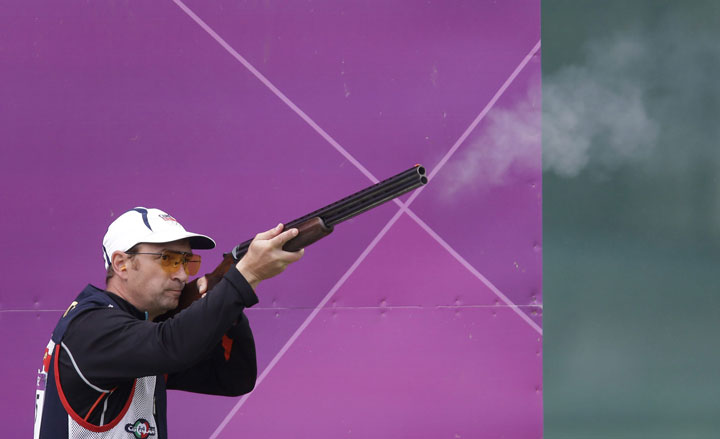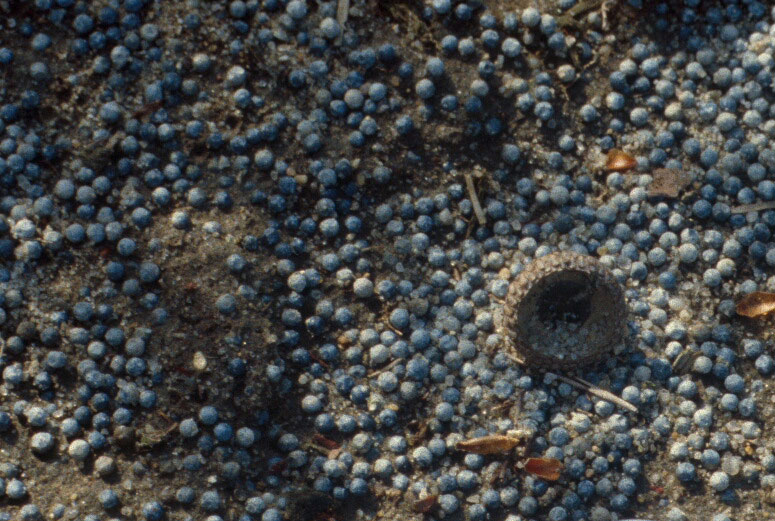TORONTO – The International Olympic Committee is failing the environment by allowing lead shot to be used in Olympic events, according to three University of Guelph researchers.

The trio is calling on the IOC to ban lead shot in skeet and trap shooting competitions in particular. When the guns fire, the lead shot spreads out. The biathlon event at the Winter Olympics collects its lead shot in the targets.
Lead shot, as with any other lead product, is toxic. Its preponderance in the environment due to the practices by hundreds of hopefuls leading up to the Summer Olympics is what concerns the paper’s authors, Vernon Thomas, Raimon Guitart, and former Environment Minister David Anderson.
“It’s this iceberg effect where, the tip is the actual Olympic Games, and then below that you have all the various hopefuls who would love to qualify and then all the people who are on the qualifying team who practise assiduously,” said the paper’s lead author Vernon Thomas, professor Emeritus at the University of Guelph.
“Then you multiply that by the hundred plus nations that want to compete in those Olympic disciplines over four years. And if you’re on the team or a hopeful or a candidate, you’re firing at least 1,000 rounds a week, that’s about 1.3 tons of lead released to the environment every year…by each individual.”
While the IOC claims to have the environment at heart, with Olympic Charter: 2013 Chapter 1, Rule 2 stating that its goal is “to encourage and support a responsible concern for environmental issues, to promote sustainable development in sport and to require that the Olympic Games are held accordingly.” The fact that it continues to allow the use of lead shot, according to the researchers, is contradictory to its charter.
READ MORE: Sochi environmentalist sent to prison for 3 years
Vernon’s work as an ornithologist is what raised his awareness to the issue of the poisoning of birds. He took part in the development of alternatives for lead shooting, which are being used today across the country after the ban of lead shot in the hunting of migratory birds in Canada in 1999 (it can still be used in non-migratory bird hunting).

Get daily National news
Though some efforts have been put into place to collect lead from shooting ranges, there are limits to their recovery, mainly because the lead shot may be deformed or fly off in different directions, thereby overpassing berms or other methods seeking to collect it.
Former environment minister David Anderson, a former Olympian himself, feels strongly about the role of the IOC in the lead shot ban. (Anderson won a silver medal at the 1960 Olympics in Rome in rowing.)
“It really, at this point lies with the IOC,” said Anderson. “Because they have embraced environmental stewardship and sustainability in their Charter.”
The International Shooting Sport Federation (ISSF) is the governing body for international competition. Both Vernon and Anderson said that if the IOC took charge with the ban, the ISSF would likely follow suit.
But the responsibility also lies with the United Nations. The United Nations Environment Programme (UNEP) governs the IOC events. UNEP devotes itself to environmental issuess, and even had an International Lead Poisoning Awareness week from Oct. 20 to 26, 2013. Anderson said that it, too, holds a great deal of responsibility when it comes to banning lead shot.
“I feel quite strongly that an organization devoted to world environmental protection should use its influence on a world sporting body,” Anderson said.
“Lead is toxic, period. There’s no two ways about it,” said Anderson.
Aversion to change
One of the reasons that there may be a reluctance to change to steel shot in competition is that the records will no longer be comparable. But there are already differences between each year an event is held: temperature differences, wind variations, and even the background makes a difference. No two competitions are exactly alike.
“And we’ve had all sorts of changes to the Olympics,” said Anderson. “Think of fibreglass and then boron and other composite materials used for vaulting poles.”
And cost wouldn’t necessarily be a factor: both Anderson and Thomas said that the cost is negligible. A call to Bass Pro Shops in Vaughan found that there was no difference at all between a box of 12-gauge, 2 3/4 length number 7 steel pellets and that of lead for hunting.
Though lead has been banned in paint, gasoline and other items, when it comes to birds and animals, there doesn’t seem to be as much of a concern, says Thomas.
“When it deals with humans, we take a different approach and we’re more concerned,” he says. As an ornithologist more than 20 years ago, Thomas would see ducks and geese come to him dead after ingesting lead shot.
“It takes only about six lead pellets to produce fatal lead poisoning in a piece of waterfowl,” Thomas said.
It would take the bird about one to two weeks to die.
“What happen is that the lead, which is a rather pervasive toxin, interferes with the motility of the gut, so they cannot move food through their gut, so they become starving birds.”
Another effect is the what it does to the birds’ nerve impulses to the muscles. The lead will result in weak muscles, which prevents them from having the strength to take off, or worse, from keeping their heads above water.
“When you look at the magnitude of that loss, you realize that something has to be done.”
The authors of the study hope that the IOC, after Sochi, will put the change into place for the 2016 Summer Olympics, to be held in Rio de Janiero, Brazil.
“It may be 2020 instead of 2016, but with two years to go that’s plenty of time for any lead shot shooter to familiarize themselves with characteristics of steel shot,” Anderson said.
Adam Landriault, Operations Manager at the Shooting Federation of Canada, said that it’s unlikely to be considered before 2016.
“The way shooting sports normally operate are in the quadrennial,” he said. “Athletes have a training program that is normally four years long.”
But Anderson hopes that the IOC will commit itself to the goal of going lead-free in the years to come.
“If the IOC takes this step it will spread,” Anderson said.
Calls to the International Shooting Sport Federation were not returned.







Comments